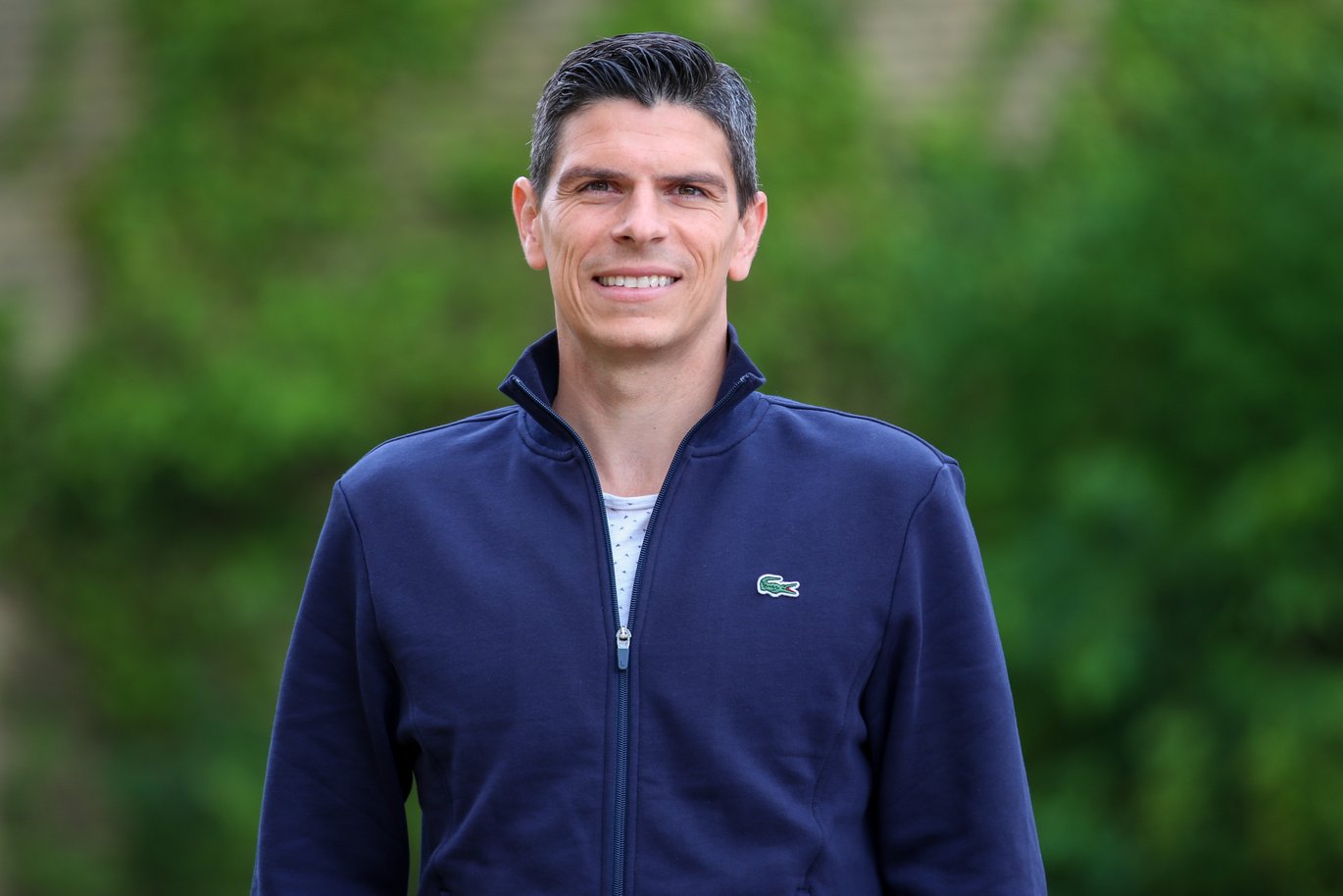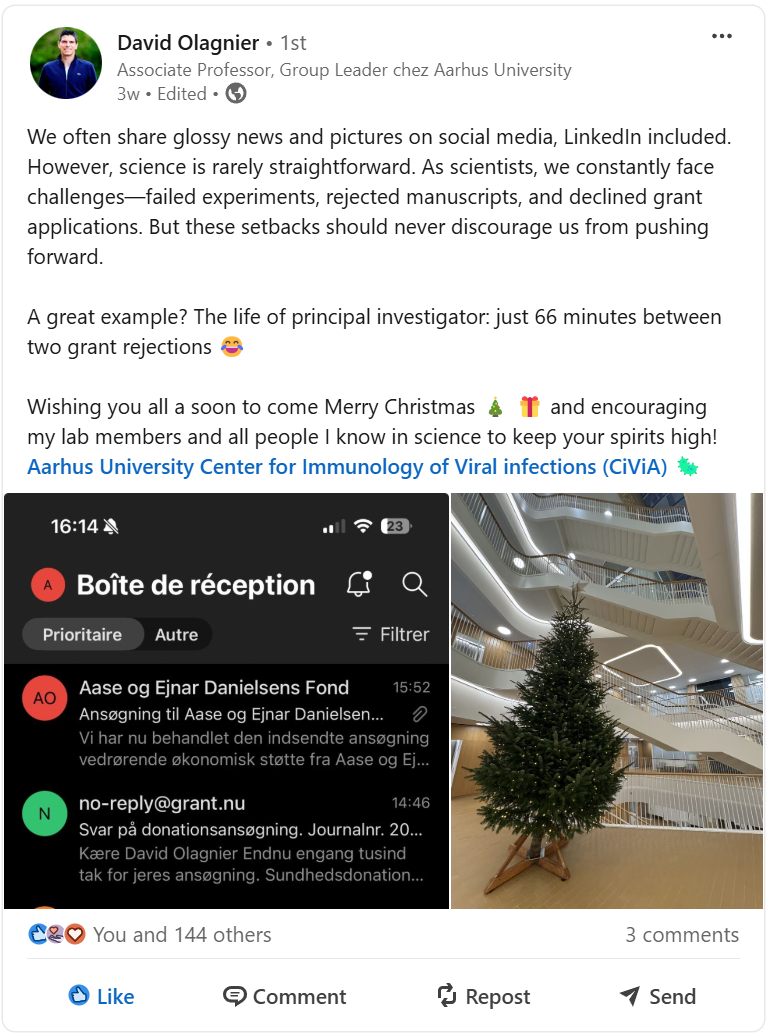Received two grant rejections in 66 minutes
Shortly before Christmas, Associate Professor David Olagnier from the Department of Biomedicine sat down at his keyboard after a somewhat atypical workday. He wrote a LinkedIn post about how the job as a researcher and research leader can be challenging—and about not letting oneself be discouraged as a result.

David Olagnier, an expert in viral immunology, is no stranger to the research world. Yet, in December, he encountered a novel experience when his inbox was hit with two rejection emails for grant applications within just over an hour.
"We often share glossy news and pictures on social media, LinkedIn included. However, science is rarely straightforward. As scientists, we constantly face challenges – failed experiments, rejected manuscripts, and declined grant applications. But these setbacks should never discourage us from pushing forward.”

Rejections are an important part of the process
This is how David Olagnier began his post on LinkedIn after receiving the two rejections. According to the associate professor, rejections of applications for external research funding are not uncommon—almost the opposite. But this time, the situation felt almost tragically comical.
"I was inspired by a moment of reflection when the two rejections dropped into my inbox one after the other. So my post on LinkedIn was probably mostly a reminder to myself, my colleagues in the lab, and other followers that perseverance and resilience are key in research," says David Olagnier and elaborates:
"Often, we focus on the specific rejections or failures, but they are only part of the process. The post was therefore a reminder to stay focused, see the bigger picture, and remain motivated. Because perseverance and high-quality work always pay off in the long run – at least in my opinion."
David Olagnier compares research to playing the lottery or buying scratch cards.
"Losing is part of the process, and you lose more often than you win. But the winnings can be incredibly rewarding. And if you don't continue to 'play' – that is, to submit, experiment, and push yourself and the research forward – then you don't give yourself a chance to win. Rejections are just part of the journey, and they don't define the value of the work," he says.
We should share both victories and defeats
Furthermore, David Olagnier believes it's crucial that he, as a research leader, involves the entire research group in both defeats and victories. He wants to be as transparent and inclusive as possible.
"When we experience setbacks, I make sure that we in the group discuss what went wrong and encourage everyone to contribute ideas on how we can move forward. It fosters a culture of shared responsibility and continuous learning," he explains.
David Olagnier also makes an effort to celebrate the research group's good results, the successes, while recognising individual contributions and emphasising the collective effort. In his experience, joint celebration of success and recognition creates a sense of ownership and motivates the team to continue pushing boundaries.
As a research leader, David Olagnier has the opportunity to shape the direction of exciting projects, mentor and collaborate with talented young researchers, and contribute to advancing knowledge. That is the best part of the job. But he also has the responsibility to handle the professional and group dynamic challenges that can arise in the lab.
"It's incredibly rewarding to see the team grow and achieve milestones together. It motivates and delights me. And I take the small challenges in stride – I go to work happy every single day," he says.
The balance between the team's needs and one's own career development can be hard to find
David Olagnier further explains that the hardest part of being a research leader is balancing the many responsibilities, such as securing funding, managing team dynamics, and ensuring project progress, while also keeping focus on long-term goals and innovation.
"I readily admit that it's sometimes a challenge to handle the human dimension within the team. Each employee is different, and I, as a research leader, need to understand and accommodate each individual's unique strengths, motivations, and challenges to build a cohesive group," he explains.
David Olagnier believes that traditional researcher education does not fully prepare researchers for the complexities of leadership.
"You have to learn along the way, make mistakes, and constantly adapt to meet the team's needs, the project's demands, and your own career development," he says.
Working collaboratively instead of project-specific
The task of seeking external funding occupies a significant part of David Olagnier's time; he estimates that he spends about 30 per cent of his working hours applying for funding for either his own or the group's research projects. This includes preparing applications, identifying relevant funds, and coordinating with collaborators.
David Olagnier's approach to external research funding is, as far as possible, collaborative rather than project-specific.
"Instead of allocating funding to individual projects, I focus on pooling resources so that everyone can benefit from the overall budget. This gives us the flexibility to allocate funds where they are most needed across different projects, so all researchers in the lab have the necessary support for their research," he explains.
He mentions that research funding as a discipline is extremely competitive and that the group's success rates vary greatly depending on the programme and the quality of the application. At the same time, he is pleased that in Denmark, we are privileged to have smaller private funds that also support research projects.
"It takes time to identify the small funds, but I think the time is well spent – in any case in the long term. The smaller grants from these small funds can to some extent maintain the operating costs in the laboratory," he says and continues:
"That being said, we are of course also dependent on the larger grants from the large foundations, and we are not discouraged by rejections. Not even when they come like pearls on a string," says David Olagnier with a smile.
Contact
Associate Professor and PhD David Olagnier
Aarhus University, Department of Biomedicine
Phone: +45 31 41 07 50
Email: olagnier@biomed.au.dk
Read more about David Olagnier and his research in the article "Research breakthrough makes cancer-fighting viral agent more effective."
Facts about David Olagnier and his research group
- Full name: David Pierre Christophe Olagnier.
- Nationality, residence, and marital status: I am French and married with 2 kids.
- Education: I hold a PhD in Immunology and Infectious Diseases.
- Research area: I research viral immunology and use, among other things, genetically modified viruses to combat cancer cells.
- Ongoing grant applications: I am currently working on one large grant application—a Novo Nordisk Foundation Hallas-Møller Ascending Investigator Grant.
- Research group: The number of members in my lab varies from semester to semester, but on average we are about 10 employees – one lab manager, one lab technician, one assistant professor, two postdocs, two PhD students, and 2–3 bachelor and master's students.